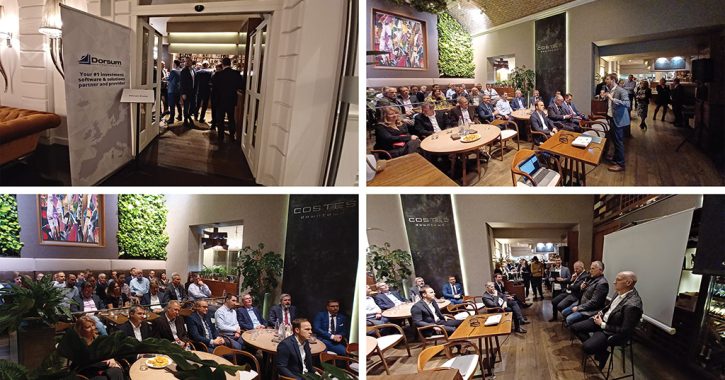Today, the competition between traditional and disruptor financial institutions engages the entire world, sometimes even sparking fights for customers. The Dorsum Club is an event with a longstanding tradition where domestic investment advisors and service providers can freely exchange ideas in a friendly atmosphere. The November edition of the event featured a panel discussion titled ‘The Great Brokerage Duel’. The invited panelists represented three types of players seated around one cake. Who will take the largest slice?
Tamás Léder, head of Revolut Bank in Hungary, believes that providing a service is not only about being as cheap as possible. Take, for example, Bolt, the first in the market to introduce taxi ordering through a mobile application. Despite the fixed taxi fare in Budapest (and despite other similar service launches), most people still choose the Estonian company because its customer experience remains outstanding. Fresh and innovative companies are still in their developmental phases, and in 15-20 years, those customers who grew up in the digital world will be the ones sitting on significant wealth – they might prefer digital alternatives.
The CEO explained that Revolut treats the stock market and crypto as separate sectors, serving them with distinct entities. The types of products they develop are constantly changing; the Revolut platform is flexible, striving for the best products. They don’t contemplate traditional asset management; instead, they prefer ETFs, but they don’t use traditional premium and private banking segmentation. According to Léder they seek solutions that can function simultaneously in multiple European countries.
Róbert Cselovszki, CEO of Erste Investment Zrt., said that the world is changing rapidly, and alongside success stories, many more companies haven’t achieved a breakthrough. Hence, companies must treat aimless innovations with caution. He explained that in the past, Erste launched a program called ‘Hozampláza’ that allowed clients to choose from a wide range of fund manager products. The program was unsuccessful, and the CEO primarily attributed this to the decision-making inability of the clients. Investors cannot adequately select a suitable and advantageous investment when they have too many options. Therefore, Erste does not recommend its clients to invest in cryptocurrencies; those fall into the interest of a narrower segment. According to Cselovszki, other similarly risky and profitable products exist, but he suggests avoiding cryptocurrencies.
According to Károly Régely, CEO of Concorde, digital tools are no longer sought solely by the younger generation. Older individuals are also becoming more interested in digital financial services since they believe these tools are more convenient and easier to use. However, he also highlights that it’s crucial to analyze the offered products and services before implementing them, as their pricing can be diverse. Something might seem cheap, but the total cost may become high due to embedded costs (e.g., financing, a contract location different from the main market, a built-in swap differential, etc.) imposed by the service provider. Régely explained that each tool serves a different purpose, and it’s important to choose carefully how to use them.
The CEO firmly stated that Concorde doesn’t attempt to create innovations; instead, due to economies of scale, they adopt and further develop existing technologies developed by others. While they do offer a platform for those interested in buying crypto, they do not venture into estimating the internal value or price fluctuations of Bitcoin, for instance.
Very few were able to enter the market in time and benefit from the rise of cryptocurrencies; the average investor, due to late entry, still sits in a position of loss, he cautioned the audience.
Bálint Fischer, Director of Business Development at Dorsum, spoke about the future of wealth management. He mentioned that the profit margins of wealth management service providers have significantly narrowed over the years, and their value chain has fragmented. Fintech players cover about a tenth of the wealth management market, but in the coming years, this is expected to increase, posing a challenge for the older players in the financial sector.
However, new, innovation-driven regulations might shape the future’s value chain. For example, the EU’s legislative package containing proposals like PSD3, PSR, and FIDA could bring Open Finance to wealth management within a few years. Moreover, a regulation accepted in the spring, the ‘DLT Pilot Regime’ will disrupt the market. Under this, market players will have the opportunity to issue securities on a distributed ledger technology (DLT), offering numerous new business opportunities. In such a system, an issuer faces fewer technological hurdles in issuance and sale, potentially making operations faster and cheaper.
Similar changes could potentially lead to a peer-to-peer revolution in the investment landscape, akin to those that have swept through numerous industries – think of companies like Airbnb or Uber.
At the conclusion of the presentations, Bálint Kummer (Product Manager responsible for Dorsum’s securities management software) introduced the company’s new-generation securities services system. He mentioned that in line with rapidly changing business needs, Dorsum developed a system that enhances the flexibility of capital market participants, whether it involves new client demands, automated backend processes, or regulatory compliance. Then, he showed that just like LEGO bricks, each business process in the system consists of modules. These modules can be combined in numerous ways to meet specific needs.
Original article in Hungarian can be read here.



